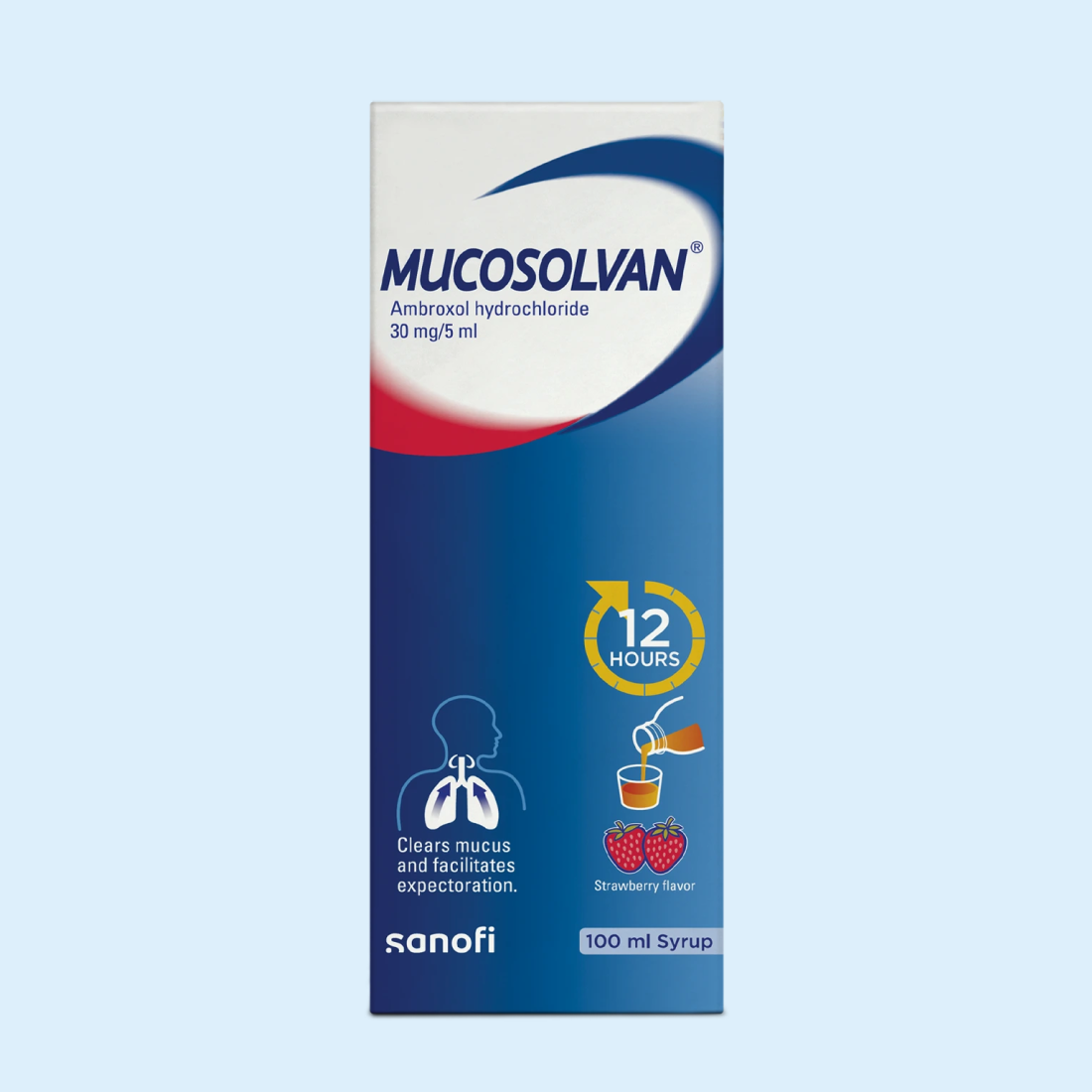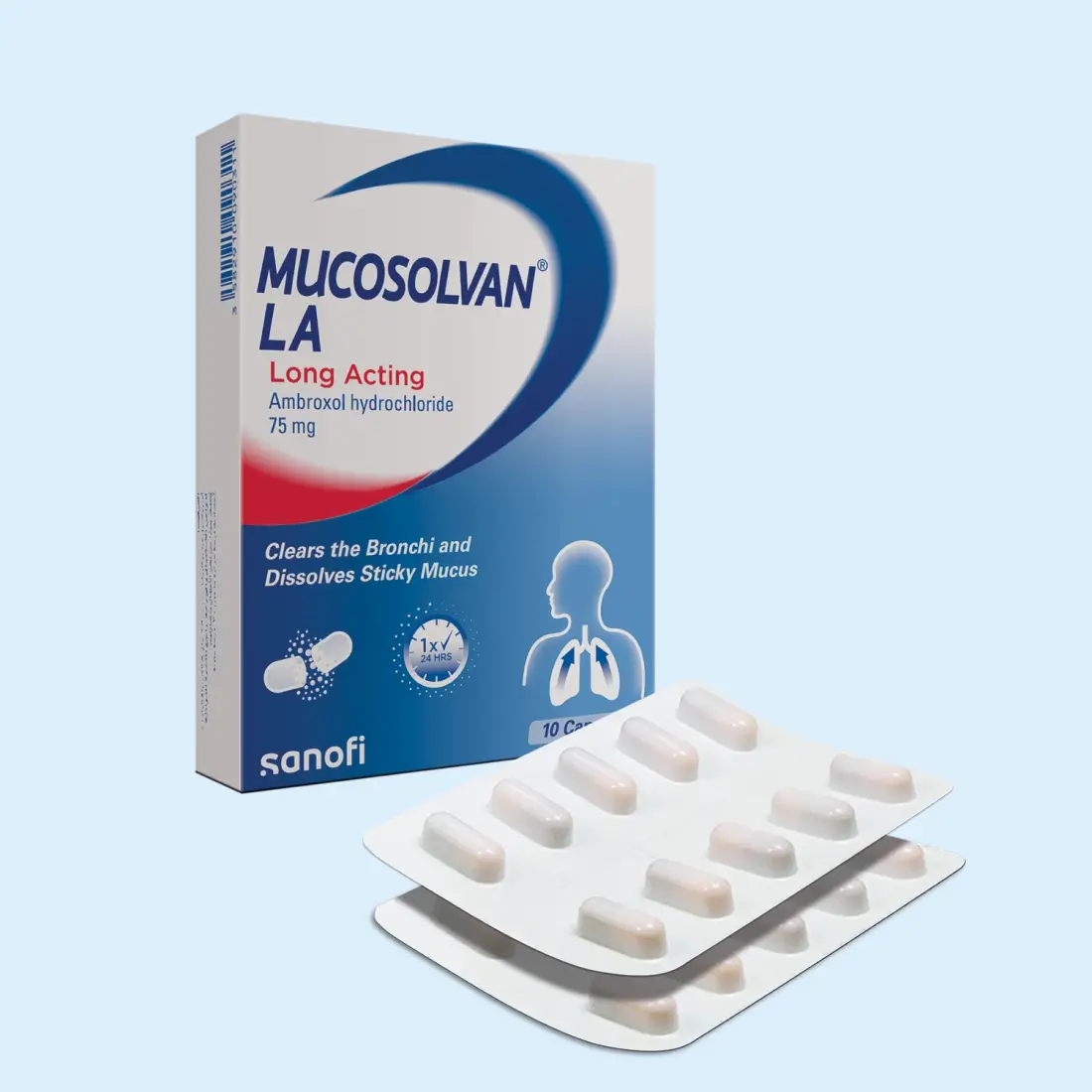
What causes a cough in the common cold?
As we know, common colds are typically caused by viruses 1. Once you get an infection from a common cold virus, your immune system starts fighting it. This causes the common cold symptoms. Viruses cause inflammation in your airways 1, irritating your nerve endings and making you hypersensitive leading to coughs 1, 2.
We all have a natural cough reflex. Its role is to protect us against germs and other “intruders.” For example, when we inhale heavy smoke, or when food goes down the wrong pipe, the cough reflex is there to keep our airways clean, or to keep us from choking 1.
But when we’re down with the common cold, this cough reflex becomes so sensitive that it keeps us up at night, and can even make it hard to maintain a conversation.
What is a Productive cough? Causes and symptoms
We tend to talk about “productive cough” and “dry cough” as though they are different things, but in the common cold, they are actually two sides of the same coin: our bodies’ fight against the viral infection 1, 2.
We typically use the term “productive cough,” or chesty or wet cough, to talk about a cough that produces mucus or phlegm 2, 3. We say a cough is dry, tickly, or unproductive when it does not produce any mucus or phlegm 3. The fact is, as a common cold runs its course, we can go through different stages of cough, and actually have both “types” of cough at different points in time 1.
For example, at the beginning of the infection, we may experience a dry, tickly cough that keeps us up at night 1. This is caused by the inflammation of the upper airways 1.
As time goes on and the cold progresses, the inflammation moves down into our lower airways 1. At this point, as our body tries to fight off the infection by increasing mucus production in an attempt to protect against the virus 1. By trapping viral particles in its sticky goo, the mucus helps clear them out — and what better way to do that if not with a cough? That’s when we start having the so-called productive cough 1.
This mucus can be very bothersome and this is where cough remedies may come in handy.
Please note that a productive cough alongside the common cold doesn't usually last as long as a productive cough that’s a symptom of a more severe illness, such as chronic bronchitis or bronchiectasis These conditions will likely also mean a greater overproduction of mucus compared to a productive cough that is a symptom of the common cold.
How to get rid of a productive cough?
If you have a cough from the common cold and it’s bothering you, you can try taking some non-prescription cough remedies. Cough remedies contain active ingredients that have been shown to help relieve coughs in different ways.
For example, dextromethorphan (Bisolvon Antitusivo) acts on the cough reflex to reduce its super-sensitivity, relieving your cough 2, 4, 5.
Other compounds, such as bromhexine (Bisolvon) and ambroxol (Mucosolvan), can thin the mucus in your airways and clear it out 5. This can shorten the duration of your cough and make it less intense 5. Ingredients like ambroxol also have anti-inflammatory and antioxidant effects, which might explain why they help against coughs 5.
Some herbal remedies also contain ingredients that can help you cough less often, and less severely 5. For example, plantain, thyme, and marshmallow (Bisolherbal) have been shown to relieve coughs 5, 6.
FAQs
Typically, we use the words “dry cough” to describe a cough without any mucus or phlegm, and “productive cough” to describe a cough with mucus or phlegm 3.
Studies show that some people may develop a productive cough during COVID-19 8, 9. For example, one study found that almost 45% of the people infected with Omicron (the predominant coronavirus variant that causes COVID-19) had a productive cough 8. Earlier in the COVID-19 pandemic, other studies found that 25–28% of people with COVID had a productive cough 9. That said, it is also possible to have a long-lasting dry cough as a symptom of COVID-19.
No, a productive cough does not necessarily mean pneumonia. A productive cough may have other causes 7. Furthermore, pneumonia typically causes a range of symptoms, including dry or productive cough, fever, trouble breathing, chest pain, chills, loss of appetite, and feeling generally unwell 10. If you are experiencing severe symptoms, and are concerned you may have pneumonia, talk to a doctor for a full diagnosis.

1. Eccles R. Understanding the symptoms of the common cold and influenza. Lancet Infect Dis. 2005 Nov;5(11):718-25. doi: 10.1016/S1473-3099(05)70270-X. PMID: 16253889; PMCID: PMC7185637.
2. Morice, Alyn H., A new way to examine acute cough in the pharmacy, The Pharmaceutical Journal, accessed 16 December 2022, available at https://pharmaceutical-journal.com/article/research/a-new-way-to-look-at-acute-cough-in-the-pharmacy
3. American Lung Association, Learn about cough, accessed 16 December 2022, available at https://www.lung.org/lung-health-diseases/warning-signs-of-lung-disease/cough/learn-about-cough
4. Sharma S, Hashmi MF, Alhajjaj MS. Cough. [Updated 2022 Aug 18]. In: StatPearls [Internet]. Treasure Island (FL): StatPearls Publishing; 2022 Jan-. Available from: https://www.ncbi.nlm.nih.gov/books/NBK493221/
5. Kardos P, Dinh QT, Fuchs KH, Gillissen A, Klimek L, Koehler M, Sitter H, Worth H. German Respiratory Society guidelines for diagnosis and treatment of adults suffering from acute, subacute and chronic cough. Respir Med. 2020 Aug-Sep;170:105939. doi: 10.1016/j.rmed.2020.105939. Epub 2020 Apr 25. PMID: 32843157.
6. Murgia V, Manti S, Licari A, De Filippo M, Ciprandi G, Marseglia GL. Upper Respiratory Tract Infection-Associated Acute Cough and the Urge to Cough: New Insights for Clinical Practice. Pediatr Allergy Immunol Pulmonol. 2020 Mar;33(1):3-11. doi: 10.1089/ped.2019.1135. PMID: 33406022; PMCID: PMC7875114.
7. Martin MJ, Harrison TW. Causes of chronic productive cough: An approach to management. Respir Med. 2015 Sep;109(9):1105-13. doi: 10.1016/j.rmed.2015.05.020. Epub 2015 Jul 6. PMID: 26184784.
8. Akavian I, Nitzan I, Talmy T, Nitecki M, Gendler S, Besor O. SARS-CoV-2 Omicron Variant: Clinical Presentation and Occupational Implications in Young and Healthy IDF Soldiers. Mil Med. 2022 Sep 3:usac263. doi: 10.1093/milmed/usac263. Epub ahead of print. PMID: 36056686; PMCID: PMC9494320.
9. Song WJ, Hui CKM, Hull JH, Birring SS, McGarvey L, Mazzone SB, Chung KF. Confronting COVID-19-associated cough and the post-COVID syndrome: role of viral neurotropism, neuroinflammation, and neuroimmune responses. Lancet Respir Med. 2021 May;9(5):533-544. doi: 10.1016/S2213-2600(21)00125-9. Epub 2021 Apr 12. PMID: 33857435; PMCID: PMC8041436.
10. NHS Inform, Pneumonia, accessed 16 December 2022, available at https://www.nhsinform.scot/illnesses-and-conditions/lungs-and-airways/pneumonia
a. Mucosolvan Syrup leaflet last revised in July 2022.
b. Mucosolvan 75mg capsules leaflet last revised in July 2022.
%20(1).webp)


-2.webp)



%20(1)%20(1).webp)
%20(1).webp)

